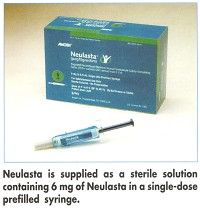Neulasta (Pegfilgrastim) Gets FDA Approval to Prevent Infections
THOUSAND OAKS, California-The US Food and Drug Administration has approved Amgen’s Neulasta (pegfilgrastim), its pegylated granulocyte colony-stimulating factor (G-CSF) that is administered as a single fixed dose per chemotherapy cycle, the company said in a news release. Neulasta is indicated for decreasing the incidence of infection, as manifested by febrile neutropenia, in patients with nonmyeloid malignancies receiving myelosuppressive anticancer drugs associated with a clinically significant incidence of febrile neutropenia.
THOUSAND OAKS, CaliforniaThe US Food and Drug Administration has approved Amgen’s Neulasta (pegfilgrastim), its pegylated granulocyte colony-stimulating factor (G-CSF) that is administered as a single fixed dose per chemotherapy cycle, the company said in a news release. Neulasta is indicated for decreasing the incidence of infection, as manifested by febrile neutropenia, in patients with nonmyeloid malignancies receiving myelosuppressive anticancer drugs associated with a clinically significant incidence of febrile neutropenia.
Until now, filgrastim (G-CSF, Neupogen), also an Amgen product, was the only agent approved for this use. However, the burden of daily dosing (sometimes for as many as 14 consecutive days) has led many health care professionals to wait to intervene with filgrastim until after a chemotherapy patient developed a neutropenic infection, the company said in a news release.

With Neulasta, a polyethylene glycol molecule, or PEG unit, is added to enlarge the filgrastim molecule, thereby extending its half-life and causing it to be removed more slowly from the body. This allows for administration in a single dose per chemotherapy cycle.
Self-regulation (neutrophil-mediated clearance) of Neulasta allows the drug to remain in the blood throughout the time during which a patient is neutropenic and then be cleared rapidly when it is no longer needed (as neutrophils recover toward normal levels). "The less frequent dosing of Neulasta means that patients will require fewer painful injections, fewer office visits for those injections, and fewer disruptions to their lives at a time when they are overwhelmed with a serious disease," said Frankie Ann Holmes, MD, a lead clinical trial investigator and associate director of research at US Oncology, Houston.
Data from two pivotal phase III studies in breast cancer patients demonstrated that a single dose of Neulasta provided protection from infection comparable to a mean of 11 daily injections of filgrastim (5 µg/kg/d), reducing both the duration of severe neutropenia and the frequency of neutropenia with fever.
The randomized, double-blind trials were conducted in breast cancer patients undergoing up to four cycles of chemotherapy with doxorubicin and docetaxel (Taxotere). In one study of 310 patients, the Neulasta dose was 100 µg/kg and in the other study (n = 157), a fixed 6-mg Neulasta dose was given.
Days of severe neutropenia were comparable between treatment groups in all cycles. The mean duration of severe neutropenia in cycle 1 appeared to be no different for patients in the Neulasta and filgrastim groups: an average of 1.8 days vs 1.6 days, respectively, in the fixed-dose trial, and 1.7 days vs 1.6 days in the by-weight dosing trial. Neulasta was comparable to filgrastim with respect to rates of febrile neutropenia across all chemotherapy cycles in both studies.
The clinical trials showed that Neulasta is safe and well tolerated. The most common adverse event in patients with lymphoma and solid tumors was bone pain reported in 26% of patients. In most cases, the bone pain was controlled with non-narcotic analgesics. The most serious adverse event attributed to Neulasta was low oxygen in the blood, reported in one patient.
The recommended dosage of Neulasta is a single 6-mg subcutaneous injection once per chemotherapy cycle. Neulasta should be given approximately 24 hours after the administration of cytotoxic chemotherapy but no later than 14 days prior to the next cycle. It is available in a dispensing pack containing 6 mg of Neulasta in a single-dose syringe with a 27-gauge, ½-inch needle, and an UltraSafe Needle Guard. Neulasta is expected to be available in pharmacies in April 2002.